外研(新标准)版八年级上Module 5 Lao She Teahouse Unit 2 It descibes the changes in Chinese society课件(26张ppt)
文档属性
| 名称 | 外研(新标准)版八年级上Module 5 Lao She Teahouse Unit 2 It descibes the changes in Chinese society课件(26张ppt) | 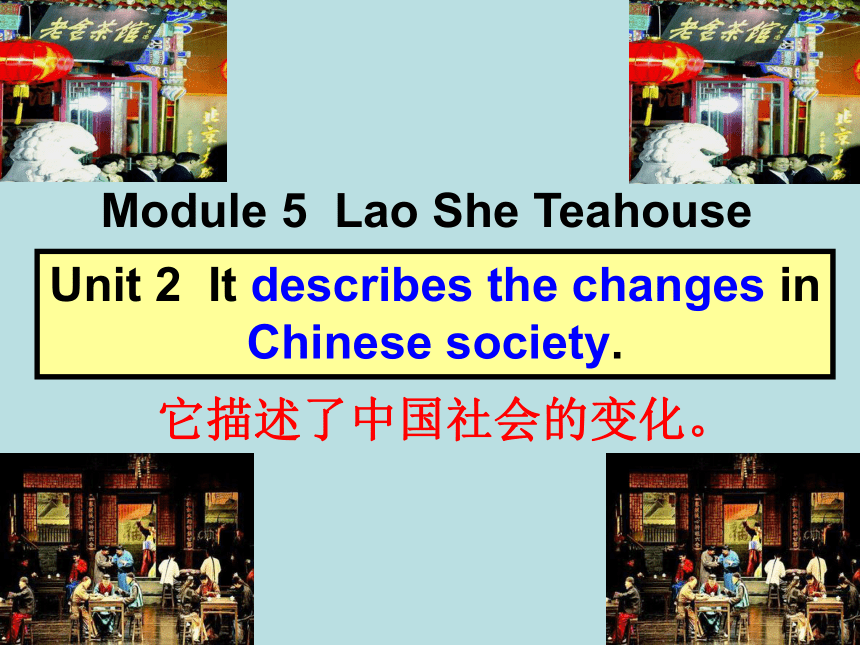 | |
| 格式 | zip | ||
| 文件大小 | 1.8MB | ||
| 资源类型 | 教案 | ||
| 版本资源 | 外研版 | ||
| 科目 | 英语 | ||
| 更新时间 | 2021-10-29 12:48:34 | ||
图片预览

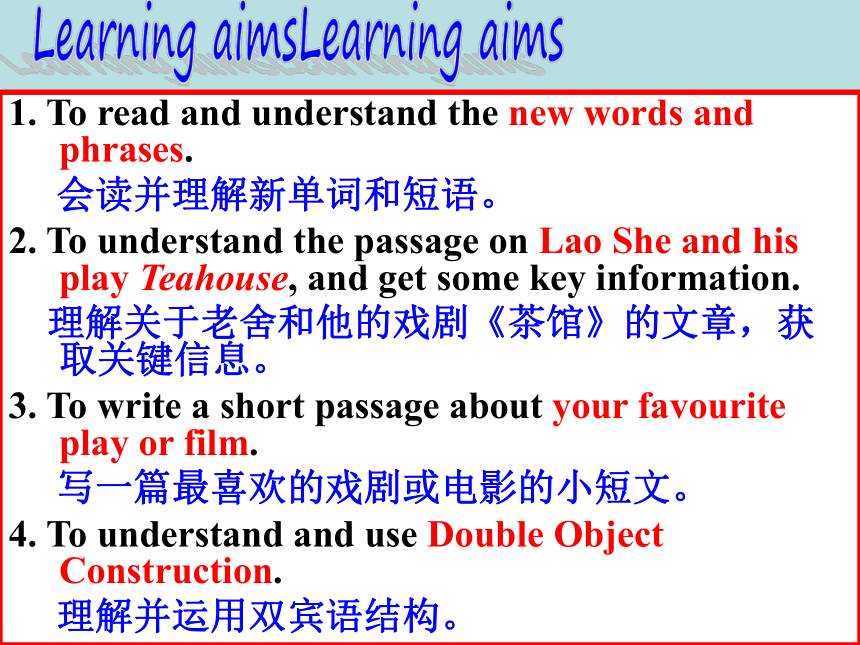
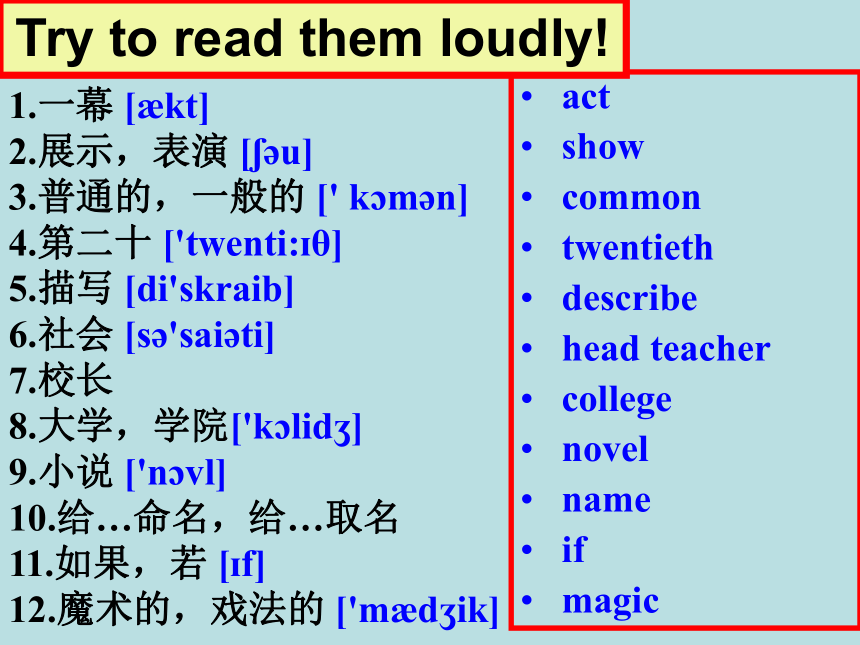
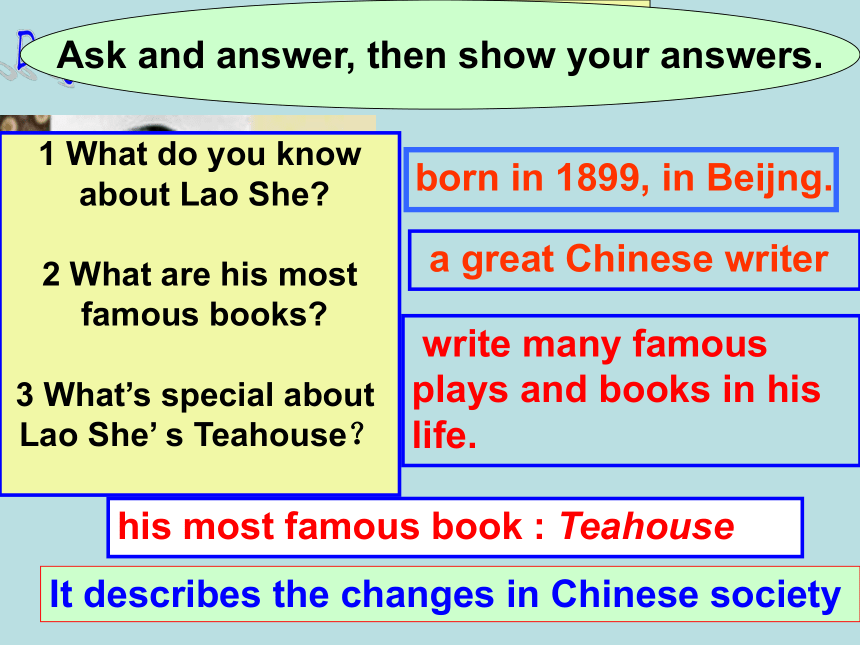
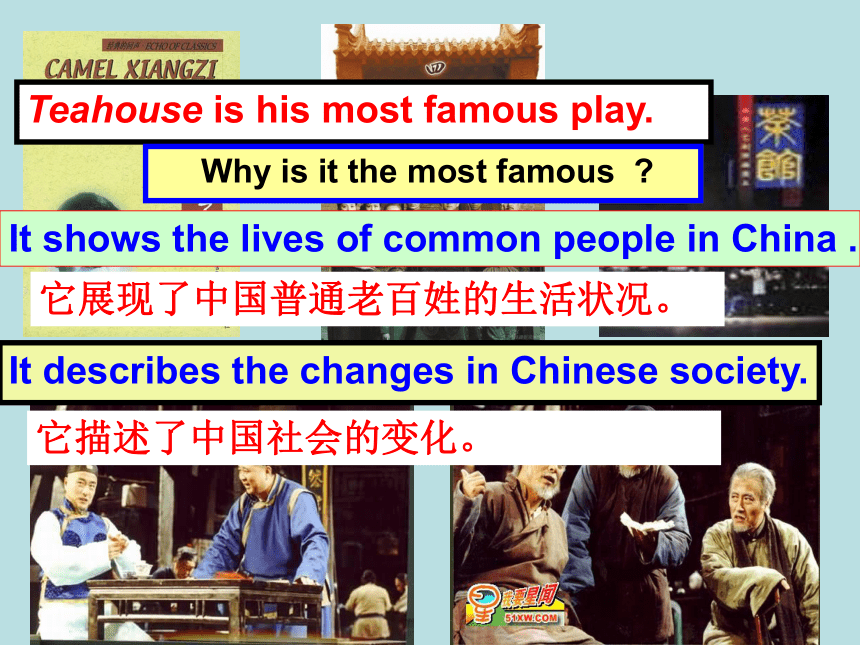
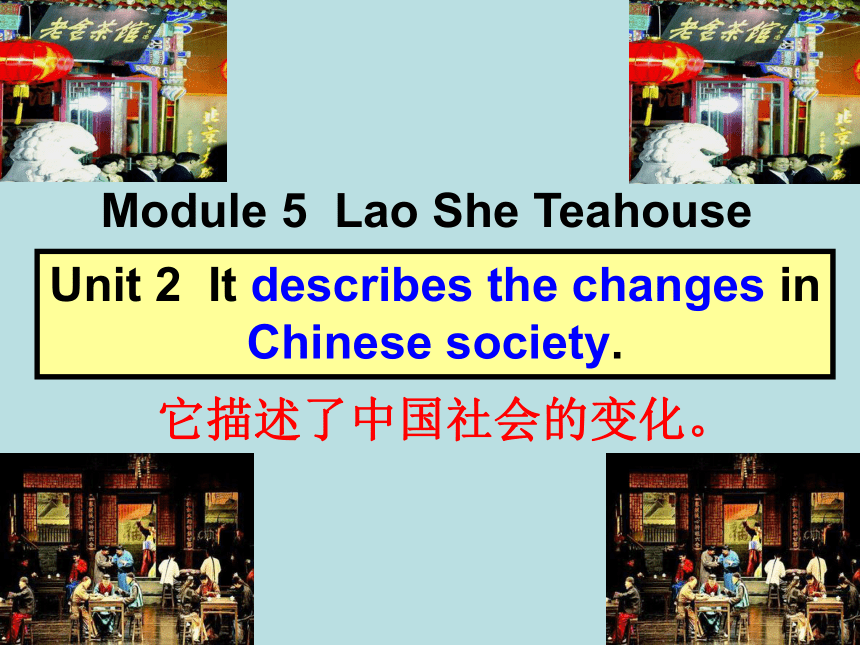
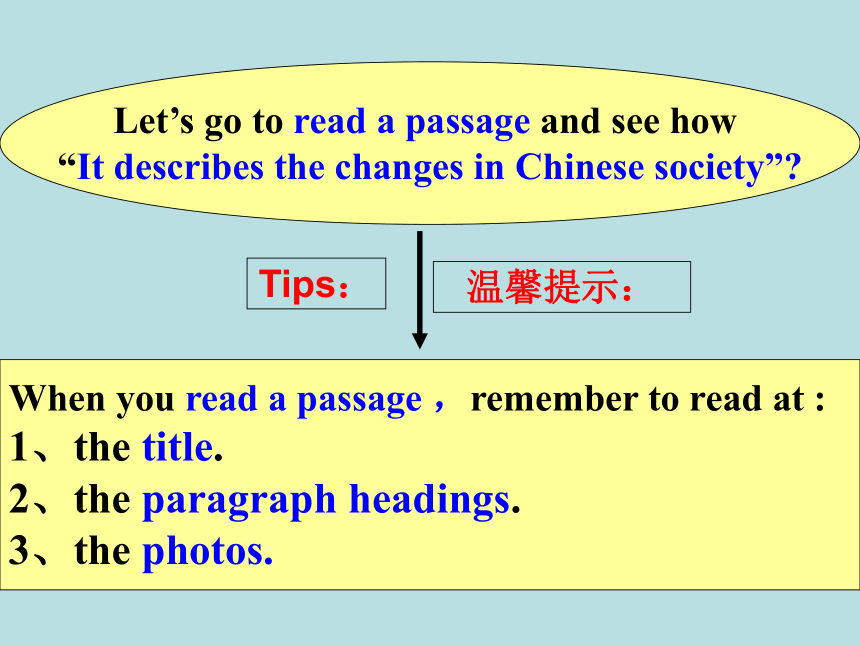
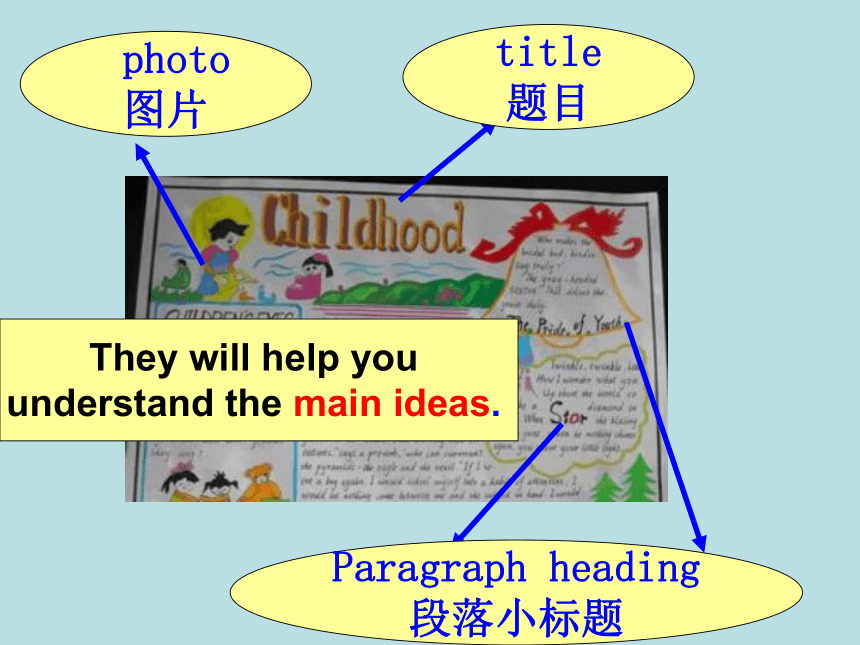
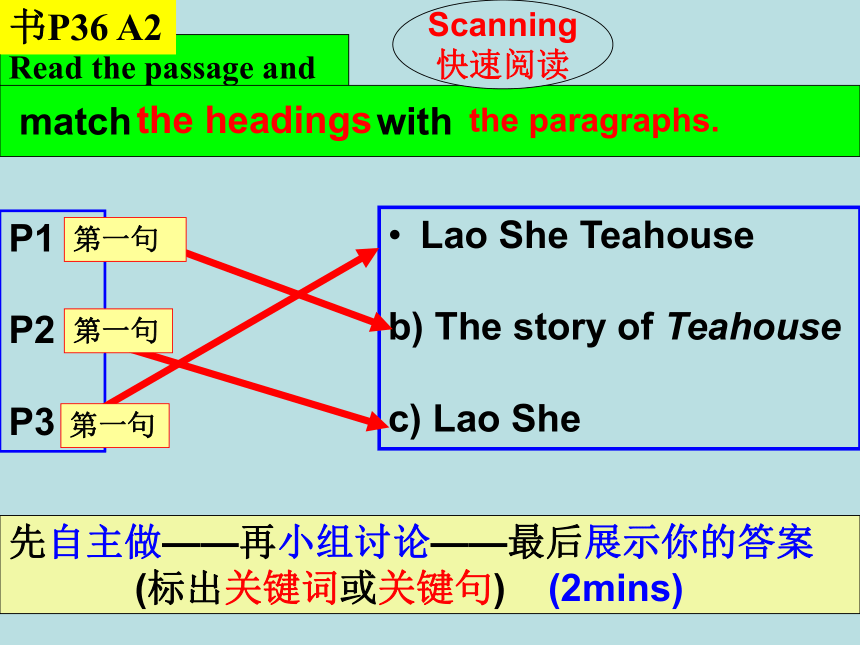
文档简介
(共26张PPT)
Module 5 Lao She Teahouse
Unit 2 It describes the changes in Chinese society.
它描述了中国社会的变化。
Learning aims
1. To read and understand the new words and phrases.
会读并理解新单词和短语。
2. To understand the passage on Lao She and his play Teahouse, and get some key information.
理解关于老舍和他的戏剧《茶馆》的文章,获取关键信息。
3. To write a short passage about your favourite play or film.
写一篇最喜欢的戏剧或电影的小短文。
4. To understand and use Double Object Construction.
理解并运用双宾语结构。
1.一幕 [ kt]
2.展示,表演 [ u]
3.普通的,一般的 [' k m n]
4.第二十 ['twenti: θ]
5.描写 [di'skraib]
6.社会 [s 'sai ti]
7.校长
8.大学,学院['k lid ]
9.小说 ['n vl]
10.给…命名,给…取名
11.如果,若 [ f]
12.魔术的,戏法的 ['m d ik]
act
show
common
twentieth
describe
head teacher
college
novel
name
if
magic
Try to read them loudly!
Do you know
born in 1899, in Beijng.
a great Chinese writer
write many famous plays and books in his life.
his most famous book : Teahouse
It describes the changes in Chinese society
Pre-reading
1 What do you know
about Lao She
2 What are his most
famous books
3 What’s special about
Lao She’ s Teahouse?
Ask and answer, then show your answers.
Teahouse is his most famous play.
It describes the changes in Chinese society.
它描述了中国社会的变化。
Why is it the most famous
It shows the lives of common people in China .
它展现了中国普通老百姓的生活状况。
Module 5 Lao She Teahouse
Unit 2 It describes the changes in Chinese society.
它描述了中国社会的变化。
Let’s go to read a passage and see how
“It describes the changes in Chinese society”
Tips:
温馨提示:
When you read a passage ,remember to read at :
1、the title.
2、the paragraph headings.
3、the photos.
title
题目
Paragraph heading
段落小标题
photo
图片
They will help you
understand the main ideas.
Read the passage and
Lao She Teahouse
b) The story of Teahouse
c) Lao She
P1
P2
P3
match with
the headings
the paragraphs.
先自主做——再小组讨论——最后展示你的答案
(标出关键词或关键句) (2mins)
第一句
第一句
第一句
Scanning
快速阅读
书P36 A2
Read and tell right (√) or wrong(×).
( )1. The play Teahouse has five acts.
( )2. Lao She learned English at a college in
London.
( )3. Lao She wrote many plays, music and
short stories.
( )4. Lao She was called “the People’s Artist”.
( )5. You can enjoy tea, food, Beijing Opera, traditional and magic shows in the teahouse.
√
×
×
taught Chinese
novels
×
three
√
Intensive reading
精读(4mins)
1957______________________________
1924_______________________________
1918_______________________________
1913_______________________________
1899_______________________________
E、born in Beijing
A、finished school and became the head teacher of a primary school
B 、wrote Teahouse
C 、went to a teacher’s school
D 、left home and went to England
In
Let’s read the answers together.
Let’s read it again and find out more about Lao She.
Intensive reading
精读(4mins)
书P36 A3
The life of Lao She.老舍的一生
In 1899 ________________
出生
In 1913 __________________
去师范学校
In 1918 _______________________________
_______________________________
完成学业,成为小学校长
In 1924_______________________________
离开家,去了英国
In 1957_________________
写了《茶馆》
finished school and became the head teacher of a primary school
was born in Beijing
went to a teacher’s school
left home and went to England
wrote Teahouse
Try to retell the life of Lao She with the help of key words and pictures.
Complete the passage with the words in the box.
century common if magic
society writers
Lao She’s play, Teahouse, has three acts. It describes the life of Wang Lifa and the changes of the lives of (1) ___________ people in Chinese (2) ________ in the first half of the twentieth (3) ________.
Lao She went to a teacher’s school in Beijing, taught in London and later returned to China. He is one of China’s greatest (4) ________.
Come to Lao She Teahouse in Beijing (5) ______ you like the Beijing Opera, traditional music or (6) _______ shows.
common
society
century
writers
书P36 A4
if
magic
Para1:
1. 最著名的剧作之一
2. 普通老百姓的生活
3. 从…到…
4. …的末尾
5. …的中间
6. 19世纪
7. 20世纪
8. 它讲述了…的故事
9. 描述变化
10. 在中国社会里
1. one of the most famous plays
2. the lives of common people
3. from…to…
4. the end of…
5. the middle of…
6. the nineteenth century
7. the twentieth century
8. It tells the story of…
9. describe the changes
10. in Chinese society
Key phrases.
Para2:
11. 送某人到…
12. 完成学业
13. 校长
14. 在一间大学里
15. 返回,返还
16. 五年后
17. 被称作
18. 最伟大的中国作家之一
11. send sb. to…
12. finish school
13. head teacher
14. at a college
15. return to
16. five years later
17. be named = be called
18. one of the greatest Chinese writers
Para3:
19. 传统音乐
20. 魔术表演
21. 热烈欢迎某人
22. 全世界
23. 发生(P37A5)
19. traditional music
20. magic show
21. give a warm welcome to sb.
= give sb. a warm welcome
22. all over the world
=around the world
23. take place
《茶馆》是老舍最著名的戏剧之一。
Teahouse is _______Lao She’s ____________plays.
2. 这部戏剧有三幕,展示了从19世纪末期到二十世纪中期中国普通老百姓的生活。
The play has three acts and shows ___________ common people in China from ______________
____________________to ___________________
_____________________.
3. 1913年他妈妈把他送去一间师范学校。
His mother ____________a teacher’s school in 1913.
Key sentences.
one of
most famous
the lives of
the end of
the nineteenth century
the middle of
the twentieth century
sent him to
one of +最高级+名词复数: …之一
the life of...
…的生活
…的末尾
…的中间
十九世纪
二十世纪
send sb. to sw. 送某人去某地
4. 他在伦敦的一所大学教汉语并且在五年后返回中国。
He taught Chinese __________in London and ____________China ________________.
5. 他被称作“人民艺术家”。
He ______________ “the People’s Artist”.
6. 老舍是20世纪中国最伟大的作家之一。
Lao She is ________________________________
of the twentieth century.
7. 老舍茶馆热烈欢迎每个来自世界各地的人。
Lao She Teahouse ______________________
everyone from________________________.
Key sentences.
at a college
returned to
five years later
was named
one of the greatest Chinese writers
gives a warm welcome to
all over the world
在一间大学里
返回;返还
五年后
be named =be called
被称作;被叫做
one of +最高级+名词复数: …之一
give sth. to sb.=give sb. sth. 给某人某物(双宾语)
all over the world =around the world 全世界
Language points.
( )1.The Changjiang River is one of ________ in the world.
A. the longest river B. the longer river
C. the longest rivers D. the longer rivers
( )2. Great changes have _____ in my home town.
A. happen B. take place
C. happened D. taken place
( )3. — Do you know the NBA star O’Neal
— Yes, he ______ “Big Shark”.
A. name B. is named C. named D. called
( )4. I will go to the park ______ it is sunny
tomorrow.
A. because B. but C. if D. so
C
D
B
C
one of +最高级+名词复数
take place(有计划的)发生/举行;
happen (偶然的,不能预见的)发生
be named= be called 被称作;被叫做
if:如果,引导条件
5. Let’s give the friends from Australia a warm welcome. (改为同义句)
= Let’s _____ a warm welcome ____ the friends from Australia.
6. Jim sent his friends the photos this morning.
= Jim _____ the photos ___ his friends this morning.
7. Please buy me a new pair of running shoes.
= Please ____ a new pair of running shoes ____ me.
8. Mum cooks us the dinner.
= Mum ______ the dinner _____ us.
行为动词后既有____,又有____
双宾语:
人
物
1. 行为动词+人+物
2. 行为动词+物+ ___/____+人
to
for
give
to
sent
to
buy
for
cooks
for
give sb. sth.=give sth. to sb. 给某人某物
send sb. sth.=send sth. to sb. 发送某物给某人
buy sb. sth.=buy sth. for sb. 买某物给某人
cook sb. sth.=cook sth. for sb. 煮某物给某人
双宾语结构中:行为动词+物+to/for+人,要识记哪些行为动词后用for,哪些用to
用to的一般有:______________________________
___________________________________________
用for的一般有:__________________________
give, send, bring, offer, show, lend,
sell, teach, tell, return, pass, write, hand
buy, make, cook, choose, draw
( )1.Mr Carter showed his collection of stamps
______ after school.
A. to them B. for them C. them D. by them
( )2. He made a new dress_____ his wife and gave
it _____ her on her birthday.
A. to; for B. for; for C. for; to D. to; to
( )3.Read the books and __________.
A. lend them him B. lend them for him
C. lend him them D. lend them to him
( )4. You took a new photo. Please ____________.
A. send me it B. send it to me
C. sent it to me D. sent me it
A
C
D
Exercises
B
注意:当物是it/them时,不能使用lend/send sb. sth.的形
式,只能用lend/send sth. to sb.的形式。也就是记住
it/them放中间。
show sth. to sb. =show sb. sth.展示某物给某人
make sth. for sb.; give sth. to sb.
lend sth. to sb. 借出某物给某人
send sth. to sb.
发送某物给某人
书P37 Learn to write.
Write down what we learnt in this lesson.
Summary
小结
Where does the story of Teahouse take place
When does the story of Teahouse take place
What is the story’s main idea
Why is it good
The story of Teahouse takes place______________.
It starts ____________________________________
____________________________________________
It describes _________________________________.
It shows ____________________________________.
in Beijing
from the end of the 19th century to
the changes in Chinese society.
the lives of common people in China.
the middle of the 20the century.
1、the place
2、the time
3、the main idea
4、why you love it
In fact, you can write a composition about
“My favourite play/book/film/writer” like this!
请根据下面的时间轴,写一篇介绍鲁迅生平的文章。要求:80词左右,要点必须写上,可以适当发挥。
Writing.
1881年 出生于浙江省
1899年 到南京读大学
1902年 到日本留学并开始通过写作帮助中国人
1909年 返国,在北京当老师
1918年 写了短篇小说《狂人日记》(Diary of a Madman)
1936年 去世,是中国二十世纪最伟大的作家之一
Lu Xun was born in Zhejiang in 1881. In 1899, he went to Nanjing to study at a university. He went to study in Japan in 1902 and began to help Chinese people by writing. He returned to China in 1909 and became a teacher in Beijing. In 1918, he wrote his famous short story Diary of a Madman.
Lu Xun died at the age of fifty-five. In his life, he wrote many novels and stories about people’s lives. He is one of the greatest Chinese writers of the twentieth century. People from all over the world read his works. (100词)
Thank you!
Module 5 Lao She Teahouse
Unit 2 It describes the changes in Chinese society.
它描述了中国社会的变化。
Learning aims
1. To read and understand the new words and phrases.
会读并理解新单词和短语。
2. To understand the passage on Lao She and his play Teahouse, and get some key information.
理解关于老舍和他的戏剧《茶馆》的文章,获取关键信息。
3. To write a short passage about your favourite play or film.
写一篇最喜欢的戏剧或电影的小短文。
4. To understand and use Double Object Construction.
理解并运用双宾语结构。
1.一幕 [ kt]
2.展示,表演 [ u]
3.普通的,一般的 [' k m n]
4.第二十 ['twenti: θ]
5.描写 [di'skraib]
6.社会 [s 'sai ti]
7.校长
8.大学,学院['k lid ]
9.小说 ['n vl]
10.给…命名,给…取名
11.如果,若 [ f]
12.魔术的,戏法的 ['m d ik]
act
show
common
twentieth
describe
head teacher
college
novel
name
if
magic
Try to read them loudly!
Do you know
born in 1899, in Beijng.
a great Chinese writer
write many famous plays and books in his life.
his most famous book : Teahouse
It describes the changes in Chinese society
Pre-reading
1 What do you know
about Lao She
2 What are his most
famous books
3 What’s special about
Lao She’ s Teahouse?
Ask and answer, then show your answers.
Teahouse is his most famous play.
It describes the changes in Chinese society.
它描述了中国社会的变化。
Why is it the most famous
It shows the lives of common people in China .
它展现了中国普通老百姓的生活状况。
Module 5 Lao She Teahouse
Unit 2 It describes the changes in Chinese society.
它描述了中国社会的变化。
Let’s go to read a passage and see how
“It describes the changes in Chinese society”
Tips:
温馨提示:
When you read a passage ,remember to read at :
1、the title.
2、the paragraph headings.
3、the photos.
title
题目
Paragraph heading
段落小标题
photo
图片
They will help you
understand the main ideas.
Read the passage and
Lao She Teahouse
b) The story of Teahouse
c) Lao She
P1
P2
P3
match with
the headings
the paragraphs.
先自主做——再小组讨论——最后展示你的答案
(标出关键词或关键句) (2mins)
第一句
第一句
第一句
Scanning
快速阅读
书P36 A2
Read and tell right (√) or wrong(×).
( )1. The play Teahouse has five acts.
( )2. Lao She learned English at a college in
London.
( )3. Lao She wrote many plays, music and
short stories.
( )4. Lao She was called “the People’s Artist”.
( )5. You can enjoy tea, food, Beijing Opera, traditional and magic shows in the teahouse.
√
×
×
taught Chinese
novels
×
three
√
Intensive reading
精读(4mins)
1957______________________________
1924_______________________________
1918_______________________________
1913_______________________________
1899_______________________________
E、born in Beijing
A、finished school and became the head teacher of a primary school
B 、wrote Teahouse
C 、went to a teacher’s school
D 、left home and went to England
In
Let’s read the answers together.
Let’s read it again and find out more about Lao She.
Intensive reading
精读(4mins)
书P36 A3
The life of Lao She.老舍的一生
In 1899 ________________
出生
In 1913 __________________
去师范学校
In 1918 _______________________________
_______________________________
完成学业,成为小学校长
In 1924_______________________________
离开家,去了英国
In 1957_________________
写了《茶馆》
finished school and became the head teacher of a primary school
was born in Beijing
went to a teacher’s school
left home and went to England
wrote Teahouse
Try to retell the life of Lao She with the help of key words and pictures.
Complete the passage with the words in the box.
century common if magic
society writers
Lao She’s play, Teahouse, has three acts. It describes the life of Wang Lifa and the changes of the lives of (1) ___________ people in Chinese (2) ________ in the first half of the twentieth (3) ________.
Lao She went to a teacher’s school in Beijing, taught in London and later returned to China. He is one of China’s greatest (4) ________.
Come to Lao She Teahouse in Beijing (5) ______ you like the Beijing Opera, traditional music or (6) _______ shows.
common
society
century
writers
书P36 A4
if
magic
Para1:
1. 最著名的剧作之一
2. 普通老百姓的生活
3. 从…到…
4. …的末尾
5. …的中间
6. 19世纪
7. 20世纪
8. 它讲述了…的故事
9. 描述变化
10. 在中国社会里
1. one of the most famous plays
2. the lives of common people
3. from…to…
4. the end of…
5. the middle of…
6. the nineteenth century
7. the twentieth century
8. It tells the story of…
9. describe the changes
10. in Chinese society
Key phrases.
Para2:
11. 送某人到…
12. 完成学业
13. 校长
14. 在一间大学里
15. 返回,返还
16. 五年后
17. 被称作
18. 最伟大的中国作家之一
11. send sb. to…
12. finish school
13. head teacher
14. at a college
15. return to
16. five years later
17. be named = be called
18. one of the greatest Chinese writers
Para3:
19. 传统音乐
20. 魔术表演
21. 热烈欢迎某人
22. 全世界
23. 发生(P37A5)
19. traditional music
20. magic show
21. give a warm welcome to sb.
= give sb. a warm welcome
22. all over the world
=around the world
23. take place
《茶馆》是老舍最著名的戏剧之一。
Teahouse is _______Lao She’s ____________plays.
2. 这部戏剧有三幕,展示了从19世纪末期到二十世纪中期中国普通老百姓的生活。
The play has three acts and shows ___________ common people in China from ______________
____________________to ___________________
_____________________.
3. 1913年他妈妈把他送去一间师范学校。
His mother ____________a teacher’s school in 1913.
Key sentences.
one of
most famous
the lives of
the end of
the nineteenth century
the middle of
the twentieth century
sent him to
one of +最高级+名词复数: …之一
the life of...
…的生活
…的末尾
…的中间
十九世纪
二十世纪
send sb. to sw. 送某人去某地
4. 他在伦敦的一所大学教汉语并且在五年后返回中国。
He taught Chinese __________in London and ____________China ________________.
5. 他被称作“人民艺术家”。
He ______________ “the People’s Artist”.
6. 老舍是20世纪中国最伟大的作家之一。
Lao She is ________________________________
of the twentieth century.
7. 老舍茶馆热烈欢迎每个来自世界各地的人。
Lao She Teahouse ______________________
everyone from________________________.
Key sentences.
at a college
returned to
five years later
was named
one of the greatest Chinese writers
gives a warm welcome to
all over the world
在一间大学里
返回;返还
五年后
be named =be called
被称作;被叫做
one of +最高级+名词复数: …之一
give sth. to sb.=give sb. sth. 给某人某物(双宾语)
all over the world =around the world 全世界
Language points.
( )1.The Changjiang River is one of ________ in the world.
A. the longest river B. the longer river
C. the longest rivers D. the longer rivers
( )2. Great changes have _____ in my home town.
A. happen B. take place
C. happened D. taken place
( )3. — Do you know the NBA star O’Neal
— Yes, he ______ “Big Shark”.
A. name B. is named C. named D. called
( )4. I will go to the park ______ it is sunny
tomorrow.
A. because B. but C. if D. so
C
D
B
C
one of +最高级+名词复数
take place(有计划的)发生/举行;
happen (偶然的,不能预见的)发生
be named= be called 被称作;被叫做
if:如果,引导条件
5. Let’s give the friends from Australia a warm welcome. (改为同义句)
= Let’s _____ a warm welcome ____ the friends from Australia.
6. Jim sent his friends the photos this morning.
= Jim _____ the photos ___ his friends this morning.
7. Please buy me a new pair of running shoes.
= Please ____ a new pair of running shoes ____ me.
8. Mum cooks us the dinner.
= Mum ______ the dinner _____ us.
行为动词后既有____,又有____
双宾语:
人
物
1. 行为动词+人+物
2. 行为动词+物+ ___/____+人
to
for
give
to
sent
to
buy
for
cooks
for
give sb. sth.=give sth. to sb. 给某人某物
send sb. sth.=send sth. to sb. 发送某物给某人
buy sb. sth.=buy sth. for sb. 买某物给某人
cook sb. sth.=cook sth. for sb. 煮某物给某人
双宾语结构中:行为动词+物+to/for+人,要识记哪些行为动词后用for,哪些用to
用to的一般有:______________________________
___________________________________________
用for的一般有:__________________________
give, send, bring, offer, show, lend,
sell, teach, tell, return, pass, write, hand
buy, make, cook, choose, draw
( )1.Mr Carter showed his collection of stamps
______ after school.
A. to them B. for them C. them D. by them
( )2. He made a new dress_____ his wife and gave
it _____ her on her birthday.
A. to; for B. for; for C. for; to D. to; to
( )3.Read the books and __________.
A. lend them him B. lend them for him
C. lend him them D. lend them to him
( )4. You took a new photo. Please ____________.
A. send me it B. send it to me
C. sent it to me D. sent me it
A
C
D
Exercises
B
注意:当物是it/them时,不能使用lend/send sb. sth.的形
式,只能用lend/send sth. to sb.的形式。也就是记住
it/them放中间。
show sth. to sb. =show sb. sth.展示某物给某人
make sth. for sb.; give sth. to sb.
lend sth. to sb. 借出某物给某人
send sth. to sb.
发送某物给某人
书P37 Learn to write.
Write down what we learnt in this lesson.
Summary
小结
Where does the story of Teahouse take place
When does the story of Teahouse take place
What is the story’s main idea
Why is it good
The story of Teahouse takes place______________.
It starts ____________________________________
____________________________________________
It describes _________________________________.
It shows ____________________________________.
in Beijing
from the end of the 19th century to
the changes in Chinese society.
the lives of common people in China.
the middle of the 20the century.
1、the place
2、the time
3、the main idea
4、why you love it
In fact, you can write a composition about
“My favourite play/book/film/writer” like this!
请根据下面的时间轴,写一篇介绍鲁迅生平的文章。要求:80词左右,要点必须写上,可以适当发挥。
Writing.
1881年 出生于浙江省
1899年 到南京读大学
1902年 到日本留学并开始通过写作帮助中国人
1909年 返国,在北京当老师
1918年 写了短篇小说《狂人日记》(Diary of a Madman)
1936年 去世,是中国二十世纪最伟大的作家之一
Lu Xun was born in Zhejiang in 1881. In 1899, he went to Nanjing to study at a university. He went to study in Japan in 1902 and began to help Chinese people by writing. He returned to China in 1909 and became a teacher in Beijing. In 1918, he wrote his famous short story Diary of a Madman.
Lu Xun died at the age of fifty-five. In his life, he wrote many novels and stories about people’s lives. He is one of the greatest Chinese writers of the twentieth century. People from all over the world read his works. (100词)
Thank you!
同课章节目录
- Module 1 How to learn English
- Unit 1 Let's try to speak English as much as possi
- Unit 2 You should smile at her.
- Unit 3 Language in use .
- Module 2 My home town and my country
- Unit 1 It's taller than many other buildings.
- Unit 2 Cambridge is a beautiful city in the east o
- Unit 3 Language in use .
- Module 3 Sports.
- Unit 1 Nothing is more exciting than playing tenni
- Unit 2 This year we training more carefully.
- Unit 3 Language in use .
- Module 4 Planes, ships and trains .
- Unit 1 He lives the farthest from school.
- Unit 2 What is the best way to travel.
- Unit 3 Language in use .
- Module 5 Lao She Teahouse.
- Unit 1 I wanted to see the Beijing Opera.
- Unit 2 It descibes the changes in Chinese society.
- Unit 3 Language in use .
- Module 6 Animals in danger.
- Unit 1 It allows people to get closer to them .
- Unit 2 The WWF is working hard to save them all.
- Unit 3 Language in use .
- Revision module A
- Module 7 A famous story
- Unit 1 Alice was sitting with her sister by the ri
- Unit 2 She was thinking about her cat.
- Unit 3 Language in use .
- Module 8 Accidents
- Unit 1 While the car were changing to red, a car s
- Unit 2 I was trying to pick it up when it bite me
- Unit 3 Language in use .
- Module 9 Population
- Unit 1 The population of China is about 1.37 billi
- Unit 2 Arnwick was a city with 200,000 people.
- Unit 3 Language in use .
- Module 10 The weathe
- Unit 1 It might snow.
- Unit 2 The weather is fine all year round.
- Unit 3 Language in use .
- Module 11 Way of life
- Unit 1 In China ,we open a gift later.
- Unit 2 In England, you usually drink tea with milk
- Unit 3 Language in use .
- Module 12 Help
- Unit 1 What should we do before help arrives?
- Unit 2 Stay away from windows and heavy furniture.
- Unit 3 Language in use .
- Revision module B
